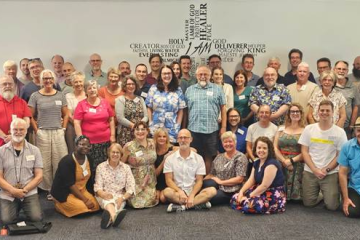1 Samuel chapter 8 and following chapters are some of the most anti-monarchist passages in The Old Testament. It wasn’t until late in the week – when it was too late to change the readings – that I realised the irony of preaching this passage on the eve of King Charles III’s Birthday Public Holiday!
This belongs to a body of material in the Old Testament, referred to as Deuteronomistic History (Deuteronomy to 2 Kings), that is characterised by a deep ambivalence towards kingship. Kings, according to the historians (like the little girl with the little curl), “when they were good, they were very good indeed, but when they were bad, they were horrid.” And underpinning all the performance reviews of kings (and queens) is a theological view that the people’s call for a king was a rejection of God. Verses 8 and 9: “They have not rejected you, but they have rejected me from being king over them. Just as they have done to me from the day I brought them up out of Egypt to this day, forsaking me and serving other gods, so also are they doing to you.”
But the ambivalence in this passage goes deeper, for despite this damning assessment of kingship, God agrees to it – three times in these verses! Verse 7: “listen to the voice of the people…”, verse 9: “listen to their voice” and verse 22: “Listen to their voice and set a king over them.” And, almost as if it is trying to be an impartial judge, the text also critiques the existing system of judges, mentioning twice (verses 3 and 5) that Samuel’s sons, who he had appointed as judges, did not follow in his ways; “they turned aside after gain; they took bribes and perverted justice.”
But what the passage is clear about – despite all the questions it raises about the people’s actions and Samuel’s actions and God’s actions – is the contrast between the ‘ways of an earthly king’ and, woven through the passage, what it reveals about the ‘ways of the heavenly king’.
The ‘ways of the earthly king’ are described in verses 11 to 18, and, reading them, I was reminded, some of you might make the connection too, of Lin-Manuel Miranda’s portrayal of George III in the musical Hamilton. So, to indulge me (it is my birthday as well as Charles III’s) let’s make way for the king – to tell us the ways of the king!
“You say my love is draining…” Jonathan Groff goes on to sing, and that is exactly how, God says, an earthly king will behave. Commentator Robert Williamson Jr puts it, “In a scathing indictment of kingship, Samuel describes the king as a taker…” In order to build and maintain (and inevitably grow) a military establishment and a royal court, the king will “take your sons” (8:11), “he will take your daughters” (8:13), “he will take the best of your fields” (8:14), “he will take one-tenth of your grain” (8:15), “he will take your [means of production] slaves and cattle and donkeys” (8:16), and “he will take one-tenth of your flocks” (8:17). Effectively you will become his slaves. “And when push comes to shove, I will send a fully armed battalion to remind you of my love!”
The love of the heavenly king, however, and the ways of the heavenly king are diametrically opposite to this. God is not a taker; God is the ultimate giver! “Every generous act of giving, with every perfect gift,” James 1:17 tells us, “is from above.” So as there are six references to what an earthly king will take in this passage, I want to contrast those with six references to what God gives in this passage.
Firstly, where the earthly king will take your sons to service his military machine or to work his fields, the passage reveals God as the heavenly king who cares, who gives ‘ear’ to God’s people. When the elders of Israel demand a king, and “the thing” (the king), the text says, “displeased” (or was evil) to Samuel, he prays – and God listens. And as I said earlier, God also urges Samuel to listen to the people, three times, even when the people are not prepared to listen to Samuel. Verse 19: “But the people refused to listen to the voice of Samuel.”
The heavenly king is one who listens. As the psalmist says, “On the day I called, you answered me; you increased my strength of soul.”
Secondly, in contrast with the earthly king who will take your daughters, the passage reveals God as the heavenly king who brings comfort. “They are not rejecting you,” God says to Samuel, “they are rejecting me.”
Samuel is presented in this passage as nearing the end of his ministry. “You are old,” the elders (ironically) tell him. And yet the ministry he goes on to do in the following chapters (in his retirement if you like!) is more significant than anything he has done until this point. This is the empowering nature of the comfort that God gives us.
And again, in verses 21-23, when the people reject him, Samuel repeats their words “in the ears of the Lord”. Why does he do this? Did God not hear them? No! He does this because he needs God’s comfort again – as we also do. In the psalmist’s words, “Though I walk in the midst of trouble, you preserve me against the wrath of my enemies.”
Thirdly, where an earthly king will take the best of your fields, God is revealed as the heavenly king who wants the best for the people but gives them agency, who chooses to empower – not disempower. “Do not be afraid,” Samuel says in 12:10, the constant refrain of Scripture, “you have done this evil, yet do not turn aside from following the Lord, but serve the Lord will all your heart…For the Lord will not cast away his people, for his great name’s sake, because it has pleased the Lord to make you a people for himself.” Even at the cost of God’s own reputation, God gives the people agency.
Fourthly, where an earthly king will take your grain, the text shows that God is the heavenly king who gives us, in giving us agency, genuine relationship with Godself. In giving us agency, in making the great name of God vulnerable to injury (one’s name is synonymous with one’s person in Scripture), God, Godself, becomes vulnerable to the pain of our rejection. This is another reason the text highlights Samuel’s sons. For just as Samuel knows the grief of sons who do not follow in his ways, so God knows the grief of being rejected by the people.
Echoes of verse 8, “They have rejected me from being king over them…” are heard throughout Scripture and heard again in the life and death of Jesus where, Romans 5:8 says, “God proves his love for us in that while we still were sinners Christ died for us.”
Fifthly, where an earthly king will take your resources, the passage reveals God as the heavenly king who offers freedom and life. There is a dramatic contrast in the passage between the king who makes them his slaves (verse 17) and the king who brought them up out of Egypt, out of slavery (verse 8), who continues to offer us freedom and life in Jesus.
Finally, where an earthly king will take your flocks and livelihoods, God is shown here as the heavenly king who gives us a livelihood, who invites us to be part of God’s work of listening and comforting and empowering, and, in our turn, feeling the pain of rejection of a world that we too love, and sharing the message of liberation and life in Jesus. We are called to this ministry – in all our ordinariness, in all our common-ness – for, as our psalm says, “though the Lord is high, he regards the lowly; but the haughty he perceives from far away.”
I am reminded of our origins as Baptists, of Thomas Helwys who wrote around 1612, The Mistery of Iniquity, and sent it to King James of England with the message, “The King, is a mortal man, and not God, therefore he hath no power over the mortal soul of his subjects to make laws and ordinances for them and to set spiritual Lords over them.” It was the first incredible statement in the English language of the principle of religious freedom. “Men’s religion to God,” Helyws writes, “is between God and themselves. The king shall not answer for it. Let them be heretics, Turks, Jews, or whatsoever, it appertains not to the earthly power to punish them in the least measure.” King James’ response was to imprison Helwys, who died in prison, but left us as Baptists with an extraordinary legacy, and charge to be people who follow God way – in God’s way – in the world.
This passage, as I said at the beginning, is deeply ambivalent about kingship. It raises many questions about the people’s actions and Samuel’s actions and God’s actions. And there are many issues facing us now about which we also feel conflicted.
We have just marked National Reconciliation Week with its theme ‘Now More Than Ever’ deliberately chosen in the wake of the failed referendum to say that the fight for justice and the rights of Aboriginal and Torres Strait Islander people must continue. All of us here are people who have benefited in some way from the conquest and colonisation of this land. This for us is deeply problematic. How do we hear the voice of God saying, “you have done this evil, yet do not turn aside from following the Lord.”.
We are being shocked and sickened every day by news of the conflict in Gaza, a conflict so long and conflicted you could trace it back to this passage with the people’s desire for a king who will “go out before us and fight out battles”. This week many of us received a video from Tim Costello calling us to pray and lament. He says he has sat with Jewish friends who knew some of the hostages and he is sending money to Palestinian friends who have lost everything and moved so many times. How do we knowing this evil has been done, “not turn aside from following the Lord.”
On a very different (very different) level this week we face the 156th Baptist Assembly where there will be a vote on the process to disaffiliate churches and disaccredit ministers that will not, that cannot, support the Association’s statement on marriage. We have come a long way, it seems, from Thomas Helwys writing that earthly institutions “hath no power over [our] mortal soul[s]…to make laws and ordinances for them and to set spiritual Lords over them.” Again, knowing this evil is being done, how do we, “not turn aside from following the Lord?”
Perhaps we keep working, to the best of our ability, in the power of our God who increases our strength of soul, to listen, to comfort, to empower, and to lament, and to continue sharing the message of life and liberation that we find in Jesus – to continue to witness to our heavenly king who came to earth to show us the true ‘ways of a king’.
Categories:


